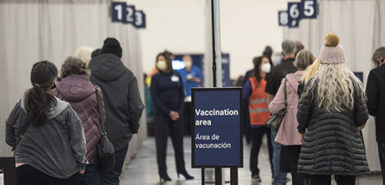
Michigan’s anti-vaccination parents, and even those inconvenienced by immunization schedules, can no longer treat their child’s non-medical waiver like an unpaid parking ticket from Timbuktu.
No more cramming it in the glove box, no pretending the wind snatched it off your windshield.
Want local school officials to let your un-immunized child into the building this fall? They need to see your progeny’s vaccination waiver, complete with your local health department nurse’s signature.
And there’s just one way to get it: Pull up a seat and listen to that nurse’s take on the goodness of vaccinations.
It’s a state rule, effective January 1.
To stanch the gush of anti-vaccination moonshine some folks have been guzzling lately, health policymakers are offering a sip of sound science in hopes of sobering a good number of minds.
Bob Swanson, immunization division director at the Michigan Department of Health and Human Services, is diplomatic about the efforts.
“What we decided to do was put in place a requirement that parents, when they want to get a non-medical exemption—a religious or philosophical exemption—they have to go to the health department and receive an education on the benefits of vaccinations,” Swanson said. “The waiver would then be signed and certified at the local health department.”
Convenience of waivers
A child should be vaccinated at key stages: a barrage in years one and two; before kindergarten; then before seventh grade. To enroll in school, they must show proof of immunization or, in lieu, a waiver form for a medical or non-medical exemption.
Michigan is one of 18 states that approve vaccination waivers for reasons medical or non-medical, the latter religious or philosophical. Nearly every state grants exemptions for religious reasons, and three allow only for medical exemptions: Mississippi, West Virginia and California.
Prior to Michigan’s rule change, parents could just print a waiver form off a website and hand it in at school, or just obtain a form from a school secretary. It was that easy.
“We were probably one of the more liberal states … in that we didn’t require a specific waiver form,” Swanson said. “And we didn’t require that it be certified.”
Michigan Department of Health and Human Services data shows a small percentage of students get medical waivers in any given year, and the rest are non-medical waivers—about 1 in 4 students are religious exemptions, and upwards of 75 percent are philosophical exemptions.
“We knew that sometimes waivers were just being used as a crutch to get kids into school,” Swanson said. “If a child entered school and their parents said, ‘Look, I don’t have my immunization record with me,’ the school would say, ‘Just sign this and you can bring your kid into school.’”
The laxity had consequences. In recent years, Michigan continuously held the fourth-highest kindergartener waiver rate in the country.
“Some of the rates were up over 20 percent even, for a county, which is really high,” Swanson said.
Kathy Maine, chief compliance officer at Spectrum Health Medical Group, has worked closely with Spectrum Health’s physicians and employees to publicize the waiver changes.
“The No. 1 concern for health care providers and the state department of community health is that parents have good information on which to base their decisions,” Maine said. “That’s really the reason waivers are now granted the way they are. The state is stepping in and saying, ‘We really need to make sure we’re providing good information to families.’”
It’s not about racking up immunizations for the sake of numbers; it’s about preventing disease.
“That’s really what we’re after, right?” Swanson said. “We want to ensure the greatest number of kids are vaccinated so that we can avoid any outbreaks.”
Outbreaks get close to home
The danger of a low immunization rate is well documented, be it globally or right here in Michigan. The Centers for Disease Control and Prevention, of course, provides a trove of data on immunization rates.
It is not too much to say the established medical community in the U.S. supports the schedule of vaccinations recommended for adults and children.
Yet, somehow, the anti-vaccination crowd continues to swell.
Maine said health care leaders are trying to get parents to understand how an anti-vaccination mindset has consequences that reach beyond their child’s classroom.
“It was a wakeup call when the outbreak occurred at Disney,” Maine said. “There was this realization that, ‘Oh, my gosh, there’s a whole world out there outside schools and day cares that we should be worried about.’
“Nothing is that local anymore,” she said. “Things spread really quickly. If 90 people are exposed to something and they went off to 30 or 40 different places when they went home, you just look at the level of potential exposure out there.”
Added Swanson: “In the world we live in now, we’re only a plane ride away from where some of these vaccine-preventable diseases are still endemic. Places where they routinely see measles, or they routinely see polio. It only takes one plane ride to reintroduce these into society here.”
In the measles outbreak at Disneyland in California, a low vaccination compliance rate likely played a significant role in worsening the situation.
Due north of Grand Rapids, Michigan, officials in Grand Traverse County have also seen how an under-vaccinated population correlates to disease outbreak.
There are similar stories throughout the U.S. in recent years.
“If we don’t ensure that the greater number in our population are vaccinated, we’re going to see those outbreaks start again,” Swanson said. “With the health care we have, there’s no reason for that. We can prevent that. We need to do the best job we can to ensure all kids are vaccinated.”
Part of that involves creating state policies that steer vaccination trends.
‘Proof of concept’
A study published this month in the journal Health Affairs found “policies such as requiring health department approval of non-medical exemptions” had a significant effect on reducing vaccine exemptions.
Mary Zimmerman, RN, Spectrum Health’s immunization program manager, has seen this play out in western Michigan.
She worked for three years at the Ottawa County Health Department, an agency that has long required parents to talk to nurses before getting a non-medical waiver for their child.
“They would come in for a waiver and basically we’d say, ‘We’re not trying to change your mind,’” Zimmerman said. “’Obviously it’s a state rule you can waive vaccinations for your child—but we want to talk to you about the diseases out there and how to protect your child.’”
Sometimes, it worked.
“There are actually some parents—not the majority—who, when they came in for a waiver, after you talked to them, they’d say, ‘You know what, I think I’m going to vaccinate,’” Zimmerman said.
Ottawa County’s waiver rate has been one of the lowest in the state. Swanson said nine other county health departments used this same policy before it was a state requirement.
“They had taken it upon themselves to put in a local policy that required this education component,” Swanson said. “We sort of had a proof of concept to move forward—these 10 counties had an overall waiver rate of 3.3 percent. If we looked at statewide rate, it was at 6.3 percent.
“It almost cuts that waiver rate in half by having this educational piece in place,” he said. “We knew that this education would help reduce the number of kids who were being waived for vaccinations.”
Michigan policymakers won’t see vaccination data from this fall’s enrollment until February, the next reporting deadline.
“So we won’t know the true effect of this until then,” Swanson said.
Mary Wisinksi, RN, supervisor of immunizations at Kent County Health Department, suspects her agency’s nurses will enjoy some success with parents who haven’t made up their minds about vaccinations.
She’d also like to win over those parents who just didn’t take the time to get their child immunized.
“We’re hoping to (reduce) the waivers that were being done out of convenience,” she said. “There’s a percentage of people where you’re not going to change their mind. Then there’s a percent who are questioners. If you give them information, and that’s our goal, it gives them something to think about.”
Kent County Health Department nurses have met with droves of parents who visited in recent months for the required consultation.
“We’ve been seeing lots and lots and lots of them,” Wisinski said. “I just looked at my one clinic; we’ve done 12 or 15 just this week.
“It’s a huge number,” she said. “There were 274 schools and 223 day cares and preschools that did their own waiver forms. Now we’re doing the work of those 400-some entities, which is OK, because people are at least having their questions answered in a private conversation with a nurse who is knowledgeable about immunizations.”
If the health experts can achieve at least that much—get people to listen and get their questions answered—the changes may be worth the effort.
Maine hopes so.
“The new waiver process is in place to make sure parents are equipped with scientifically sound information,” she said, “so that they can make an informed decision.”
 /a>
/a>
 /a>
/a>
 /a>
/a>